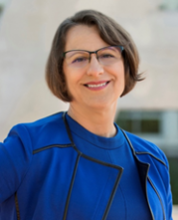MAE Seminar (ZOOM): Developing Technologies for Chemical-looping with Oxygen Uncoupling Utilization

Dean, College of Engineering
Zoom Link: https://uci.zoom.us/j/97543606100?pwd=c0d2eDdMWGtDRUdWNUlCWXRYL1puQT09
Abstract: Chemical looping is a technology that the University of Utah and Boise State University have studied for nearly 10 years. In this carbon-capture technology, an oxygen carrier is reduced in a fuel reactor (FR) to gasify or combust a solid fuel. The carrier is “looped” back to an air reactor (AR), where it is re-oxidized. While there are a few configurations considered, the basis for this work is the utilization of two fluidized bed reactors. Chemical looping with oxygen uncoupling (CLOU) is a variant of chemical looping combustion where the oxygen carrier releases gaseous oxygen. CLOU is well-suited for solid fuels as the released oxygen readily combusts with solids.
Few commercial units are available, and this study focuses on using three-dimensional computational fluid dynamic (CFD) simulations of a dual fluidized bed process development unit (PDU) to explore operating conditions and challenges. The talk will present results from different operating conditions and some studies looking at solid separation systems, an essential factor in CLOU systems.
Results predicted high sensitivity to AR and FR velocity changes, which caused large shifts in the inventory distribution between reactors. These changes affect the oxygen concentrations, which in turn caused instabilities. In addition, decreasing the coal input from 200 kW to 50 kW caused a sharp temperature drop in both reactors and decreased oxygen carrier utilization. Decreasing initial oxygen carrier bed mass predicted much higher amounts of unreacted coal in the FR and a much lower amount of free gaseous oxygen than the base case. These all resulted in instabilities as well.
Particle separation will also be discussed both in terms of ash/oxygen carrier separation and materials movement. These are both essential operating parameters when looking at potential technology implementation.
Finally, the work represents the importance of systems thinking – change one thing in the system and it affects something else. Much of research, and leadership, is like this, and I will end with a few thoughts around the importance of systems thinking in solving critical challenges.
Bio: JoAnn Lighty came to Boise State University in July 2017 from the University of Utah and the National Science Foundation, where she had served as a division director since October 2013. She currently is dean of the College of Engineering and professor of mechanical and biomedical engineering at Boise State University.
A professor at the University of Utah for 29 years, Lighty was chair of the Department of Chemical Engineering, founding director of the Institute for Combustion and Energy Studies, and associate dean for academics in the College of Engineering. She received the SWE Distinguished Engineering Educator Award, the Utah Engineering Educator of the Year from the Utah Engineering Council, and the university’s Linda Amos Award for Distinguished Service to Women.
Lighty’s research focuses on combustion-generated fine particulate matter formation, soot oxidation and her current work, carbon capture technologies. She is a fellow of the American Institute of Chemical Engineers and the American Association for the Advancement of Science. In November of 2017, she received the Lawrence K. Cecil Award from the Environmental Division of the American Institute of Chemical Engineers for her research in air quality. She has served on several national boards and committees focusing on the environmental aspects of combustion
As director of the NSF’s Division of Chemical, Bioengineering, Environmental and Transport Systems, she led 16 programs with a budget of $184 million. She was a key architect of the cross-NSF initiative, Innovations at the Nexus of Food, Energy and Water Systems, focusing on convergent research for this system of systems.
To view Lighty’s research publications, visit:
https://scholar.google.com/citations?user=hgN1Oy4AAAAJ&hl=en&authuser=1 and
Share
Upcoming Events
-
MAE 298 SEMINAR: Europa Clipper Mission Design
-
CBE 298 Seminar: Metal Electrodeposition for Modern Mineral Refining
-
MSE 298 Seminar: Quasi-1D/2D Charge-Density-Wave Materials - From Exotic Physics to Application Prospects
-
EECS Seminar: Steering Diffusion Models for Generative AI, From Multimodal Priors to Test-Time Scaling
-
CBE 298 Seminar: Finding Catalysts of Gut Reactions - The Gut Microbiota in Disease Onset and Treatment
